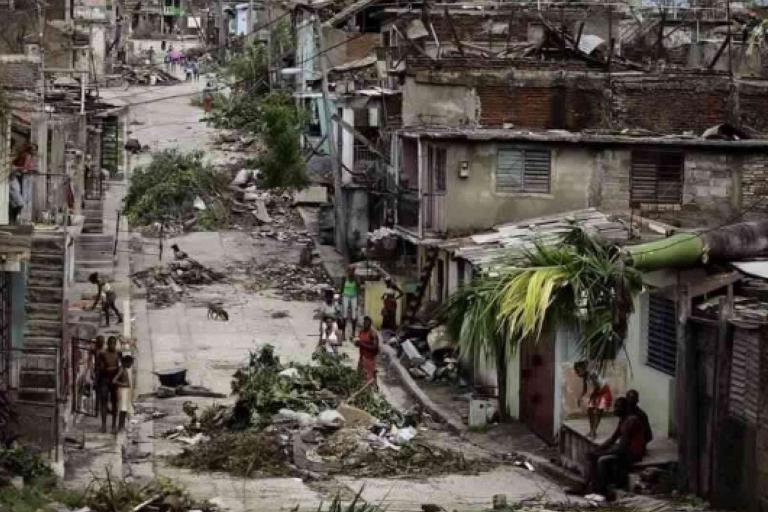Risks to Small Island Developing States spotlighted

CANCUN, Mexico, 21 May 2017 – Dozens of the world’s most climate-vulnerable island nations today spotlighted efforts to curb threats posed by hazards and to make development sustainable, ahead of the 2017 Global Platform for Disaster Risk Reduction.
Delegates from the Small Island Developing States (SIDS) grouping, which has members in all of the world’s oceans, began three days of talks on how they are meeting their steep challenges. These will feed into the Global Platform, the preparatory meetings of which begin in Cancun, Mexico, on Monday before formal sessions from Wednesday to Friday.
In an opening address, Mr. Robert Glasser, Special Representative of the UN Secretary-General for Disaster Risk Reduction, underscored that the list of SIDS “reads like a roll call for prevention, resilience and recovery from recent disasters and near misses”.
This month, Vanuatu and New Caledonia were both hit by Cyclone Donna outside the normal Pacific Cyclone season. Last October, Haiti marshalled its resources to save many lives in advance of Hurricane Matthew, but over 600 still died despite early warnings and the country is estimated to have lost 32% of its GDP in damage to housing, agriculture and critical infrastructure.
“When hurricanes, cyclones, droughts, volcanic eruptions, earthquakes and tsunamis hit a small island developing state, they typically affect the whole population. Many small islands also have to contend with localized recurring events such as storm surges, landslides and flooding,” said Mr. Glasser.
“Small population sizes can also increase vulnerabilities. If a high percentage of the population is affected, injured or killed, this can have long lasting consequences for recovery and overall development and economic activity. Future disaster losses represent an existential threat to SIDS, undermining efforts to eradicate poverty and build resilient cities and communities.”
Guinea Bissau delegate Mr. Joao Raimundo Lopes summed up the challenges starkly: “Our country basically depends on its natural resources for survival.”
Ms. Habiba Gitay, of the World Bank’s Small Islands States Resilience Initiative, said: “We have about 34 countries which are at the forefront of the impacts of climate change. They face them on a daily basis, but they also produce some of the best results and innovations that are around.”
Just over a year ago, 13 SIDS from the Caribbean, Indian Ocean and Pacific were among the first countries in the world to sign the Paris Agreement on climate change. Together they account for 0.02% of greenhouse gas emissions but are among those who stand to lose the most from climate change.
Given what SIDS have to tackle, Mr. Glasser said, they are to be applauded for “rising to the challenges and taking a leadership role in integrating action on disaster risk and climate risk in an era when extreme weather events have risen dramatically and trigger 90% of all natural hazard related disasters.”
“It is little wonder then that SIDS are on the frontline of solutions and have taken the lead in ensuring coherence in their approach to implementing the 2030 Agenda for Sustainable Development creating clear links between the Sendai Framework for Disaster Risk Reduction, the Paris Agreement and the Sustainable Development Goals,” he added.
He applauded countries including Mauritius, and regional efforts such as the Framework for Resilient Development in the Pacific, the work of the Caribbean Disaster Management Agency, and the SIDS Accelerated Modalities of Action, or SAMOA Pathway, adopted at an international conference in Samoa in 2014.
“Disaster risk management and climate change adaptation are not ends in themselves, but are meant to protect development,” said Samoan delegate Ms. Molly Nielsen.
Mr. Titus Antoine, from the Caribbean island of Grenada, underlined that his country’s policies also treat the challenges faced as part of a whole.
“We talk about managing national development along with climate change and disaster risk management,” he said.
“Having plans is one thing. But how do you really get the machine behind the plan?”
The key point, he said, is to ensure that it is not just the civil protection and disaster risk management departments that deal with the issue, but all arms of a country’s administration, which requires strong political leadership across the board.
That was echoed by Mosese Sikivou Regional Coordinator of the Pacific Resilience Program, at the Pacific Islands Forum Secretariat.
“We need ministers of finance to be pushing the agenda. We need them to step up and take an active role in the resilience agenda,” he said.
- WMO Member:

